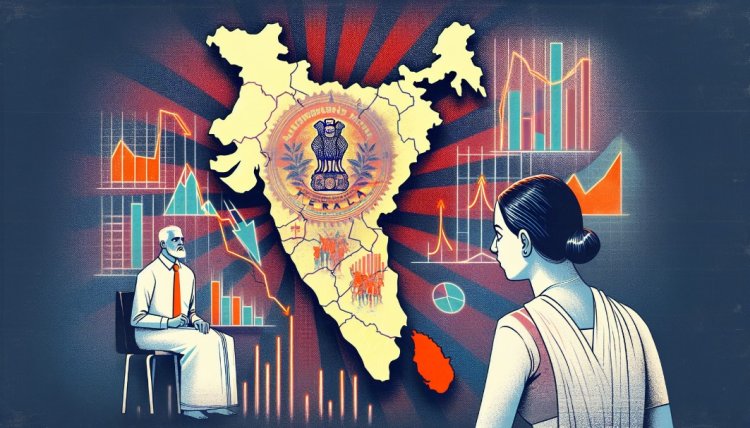The Economic Crisis in Kerala: Lessons for Every State
Unveiling the economic crisis in Kerala & its valuable lessons for all Indian states. Explore causes, impacts & strategies for fiscal sustainability.

Introduction
It's no longer God's own country but has recently become the devil's own playground
The economic crisis in Kerala has become a hot topic, with the state facing financial difficulties and on the verge of bankruptcy. This has significant implications not just for Kerala but for every state in India, as it serves as a case study of what can go wrong when state finances are mismanaged.
In this blog, we'll delve deeper into the economic crisis in Kerala, the reasons behind it, and the lessons that can be learned from this situation. Understanding these lessons is crucial for all citizens, as it can help in making informed decisions and holding the government accountable for its economic management.
Lessons to Be Covered:
-
Judging the government based on economic indicators
-
The consequences of overspending
-
Studying the causes and effects of economic crises
Kerala's Financial Crisis
Kerala is currently facing a severe financial crisis, with the state almost on the brink of bankruptcy. The state has cited numerous financial difficulties, including problems with paying salaries, a loss of Rs. 1,10,000 crores, and the need for borrowed funds to cover the state's expenses.
The situation has led to a delay in salaries for government employees, a hold on social security schemes for 55 lakh people, and a request for a bailout from the central government. The financial crisis in Kerala has significant implications not only for the state but for the entire country, as it raises questions about the state's economic management and the lessons that can be learned from this crisis.
Root Causes of the Crisis
The economic crisis in Kerala can be attributed to several factors, including inefficient tax collection, overspending, and off-budget borrowings. Kerala's spendthrift approach in the wrong direction, inefficiency in tax collection, and a high percentage of revenue being spent on interest payments for loans have all contributed to the state's financial woes.
Net Borrowing Ceiling and the Centre's Response
The tussle between the state and the centre over the financial crisis has also shed light on the net borrowing ceiling (NBC) and the centre's decision not to allow Kerala to borrow more. The centre has cut a significant amount from Kerala's share of the net borrowing ceiling and has raised concerns about the state's financial management.
Impact on Government Employees and Social Security Schemes
The economic crisis in Kerala has taken a toll on government employees and social security schemes, affecting the lives of millions of people. Here's how the crisis has impacted government employees and social security schemes:
Delayed Salaries
The delay in salaries for 3.5 lakh government employees has caused financial strain, affecting their ability to meet their day-to-day expenses. This delay has a ripple effect on the overall economy, as it impacts consumer spending and economic activity.
Hold on to social security schemes.
The state's financial difficulties have led to a hold on social security schemes for 55 lakh people, depriving them of much-needed support and financial assistance. This has created uncertainty and hardship for those who rely on these schemes for their well-being.
Request for Bailout
With the state struggling to cover its expenses, Kerala has requested a bailout from the central government. This highlights the severity of the financial crisis and the need for external assistance to address the situation.
Lessons for Every State
The impact of the economic crisis in Kerala serves as a critical lesson for every state, emphasising the need for prudent financial management, efficient tax collection, and responsible borrowing to avoid similar predicaments in the future.
Bailout Request to the Centre
The economic crisis in Kerala has reached a critical point, with the state government reaching out to the central government for a bailout. The financial difficulties faced by Kerala have led to delayed salaries for government employees and a hold on social security schemes for 55 lakh people. The state has also cited a loss of Rs. 1,10,000 crore and the need for borrowed funds to cover its expenses. As a result, Kerala is now seeking external assistance from the centre to address this dire situation.
Reasons for the Bailout Request
The request for a bailout from the central government reflects the severity of the financial crisis in Kerala. The state's inability to cover its expenses and the impact on government employees and social security schemes have prompted this plea for assistance. Delayed salaries and a hold on social security schemes have created financial strain and uncertainty for thousands of citizens, highlighting the urgent need for external support.
Implications for Every State
The request for a bailout from the centre serves as a crucial reminder for every state in India. It underscores the importance of prudent financial management, efficient tax collection, and responsible borrowing to avoid similar predicaments in the future. By learning from the economic crisis in Kerala, other states can take proactive measures to safeguard their financial stability and prevent a similar situation from arising.
Importance of Politics and Economics for Citizens
Understanding the dynamics of politics and economics is crucial for citizens to make informed decisions and hold the government accountable for its economic management. Here's why politics and economics are important for citizens:
Empower citizens to judge the government.
By being aware of economic indicators, citizens can assess the performance of the government based on its economic management. This allows citizens to cut through the chaos of propaganda and assess the government based on tangible data rather than sensationalised news.
Spending beyond means has consequences.
Citizens need to understand the repercussions of spending beyond one's means. The economic crisis in Kerala serves as a stark reminder that overspending, such as off-budget borrowings, can lead to severe financial strain and long-term consequences.
Studying Economic Crises for Informed Decision-Making
When an economic crisis occurs, citizens need to study the causes and effects of the crisis. This helps citizens keep a close watch on the government's economic management and avoid making similar mistakes in the future.
The 1 Person Club: Financial Year Preparation
As the new financial year is about to begin, it's essential to focus on preparing yourself for the upcoming year. Here's why financial year preparation is crucial:
Manage your money better.
The start of a new financial year is the perfect opportunity to take control of your finances. By setting clear financial goals and creating a budget, you can effectively manage your money and work towards achieving your financial objectives.
Take Control of Your Finances
Attending a personal finance masterclass can provide you with the knowledge and tools to take control of your financial independence. By understanding the principles of early retirement planning, tax planning, and insurance planning, you can make informed decisions about your financial future.
Exclusive Discount on Master Class
For Think School learners, there is an exclusive discount of 50% on the master class. This is an excellent opportunity to gain valuable insights and practical strategies for managing your finances effectively.
Understanding the Net Borrowing Ceiling (NBC)
The net borrowing ceiling (NBC) is a cap that the federal government imposes on states that determines how much money they can borrow in a given fiscal year. The 15th Finance Commission set this cap at 3% of the state's GDP for particular years. The NBC plays a critical role in regulating state finances and preventing excessive borrowing.
Implications of NBC
The NBC limit dictates the amount of debt a state can take on, influencing its financial decisions and resource allocation. By controlling borrowing, NBC aims to maintain fiscal discipline and stability, preventing states from falling into excessive debt and financial crises.
Centre's Authority
The centre has the authority to enforce the NBC and can adjust a state's share of the NBC based on its borrowing history and financial management. This allows the central government to intervene and regulate state borrowing to ensure responsible fiscal practices.
Impact on Kerala
Kerala's conflict with the centre over the NBC reflects the consequences of exceeding borrowing limits and the challenges that arise from financial mismanagement. Understanding the implications of the NBC is essential for all states to avoid similar predicaments and maintain financial stability.
Key Takeaway
By comprehending the significance of the NBC and its role in shaping state finances, citizens and policymakers can make informed decisions to promote sustainable economic growth and prevent financial crises.
Tussle Between the State and the Centre
The tussle between the state and the centre over the financial crisis has shed light on the net borrowing ceiling (NBC) and the centre's decision not to allow Kerala to borrow more. The centre has cut a significant amount from Kerala's share of the net borrowing ceiling and has raised concerns about the state's financial management.
Kerala's spendthrift approach in the wrong direction, inefficiency in tax collection, and a high percentage of revenue being spent on interest payments for loans have all contributed to the state's financial woes. This has led to a conflict between the Kerala government and the centre.
Kerala argues that they are receiving less taxes than their fair share from the divisible pool of taxes, which has led to a shortage of funds. Additionally, Kerala has raised concerns about the inclusion of off-budget borrowings and the centre's move to consider these borrowings in the state's account as debt. Kerala believes that this move is unfair and has further aggravated their financial situation.
The 15th Finance Commission's distribution of money to the states based on new parameters has also impacted Kerala's share of funds. Kerala argues that if the finance commission gives more weight to the 2011 data, it will receive less money due to its lower population, penalising the state for controlling its population.
Reasons Behind Kerala's Economic Crisis
Kerala's economic crisis can be attributed to several key reasons that have contributed to the state's financial difficulties. Understanding these reasons is crucial for citizens to gain insights into the challenges faced by Kerala and to learn from the mistakes made by the state. Here are the primary reasons behind Kerala's economic crisis:
Inefficient tax collection
Kerala has experienced a decline in tax collection efficiency, leading to a significant loss of revenue. This decline has been evident in the state's ability to collect taxes per 100 rupees of state income, which has decreased over the years. In addition, inefficient implementation of the GST system has further impacted tax collection, resulting in a substantial financial shortfall for the state.
Overspending and off-budget borrowings
Kerala's spendthrift approach, coupled with off-budget borrowings, has led to a significant increase in short-term expenses without proportional long-term investments. The state's capital outlay as a percentage of net expenditure and committed expenditure as a percentage of revenue receipts indicate a concerning imbalance, with a higher percentage of funds being allocated to short-term expenses rather than long-term infrastructure and development projects. Furthermore, Kerala's high percentage of revenue being spent on interest payments for loans has exacerbated its financial woes, contributing to a substantial fiscal deficit.
Net Borrowing Ceiling (NBC) Conflict
The conflict between the state and the centre over the net borrowing ceiling (NBC) has also played a significant role in Kerala's economic crisis. The centre's decision to limit Kerala's borrowing and the state's exceeding of its borrowing limits have created a challenging financial situation. Kerala's reliance on off-budget borrowings to bypass NBC limits has further aggravated its debt burden, leading to a contentious tussle between the state and the centre.
Challenges with a Divisible Pool of Taxes
Kerala has raised concerns about its declining share of the divisible pool of taxes, resulting in a shortage of funds for the state. The allocation of tax revenue by the centre, based on parameters such as population size, area, and tax collection, has impacted Kerala's financial resources. The state's argument about receiving less taxes than its fair share from the divisible pool has highlighted the challenges faced in maintaining adequate revenue for essential expenditures.
By examining these reasons behind Kerala's economic crisis, citizens can gain valuable insights into the complexities of economic management and the critical importance of prudent financial decision-making at the state level.
Inefficient tax collection
Kerala has experienced a decline in tax collection efficiency, leading to a significant loss of revenue. This decline has been evident in the state's ability to collect taxes per 100 rupees of state income, which has decreased over the years. In addition, inefficient implementation of the GST system has further impacted tax collection, resulting in a substantial financial shortfall for the state.
Furthermore, Kerala's inefficient tax collection has resulted in a loss of 25,000 crores due to its inability to follow the new IGST regime and implement the GST system quickly. As a result, the state government has been left with no choice but to take on more debt to cover its financial obligations.
The inefficient tax collection in Kerala has contributed to its economic crisis, highlighting the need for the state to address this critical issue to improve its financial stability and prevent similar predicaments in the future.
Kerala's justification for financial issues
Kerala's Finance Minister argues that Kerala's share has been declining from the divisible pool of taxes, resulting in a shortage of funds for the state. The Finance Commission of India decides how to split the revenue between states based on income, population size, area, and tax collection by the states. Kerala points out that the 15th Finance Commission distributed money to the states differently, giving more weight to 2011 data, which penalises the state for controlling its population. Kerala argues that they are receiving less taxes than their fair share from the divisible pool, contributing to their financial difficulties.
Kerala also has a problem with the inclusion of off-budget borrowings, which have been one of the highest in the country. Off-budget borrowings allow the state to borrow money indirectly through public sector units without reflecting in the government's budget. However, the government is still responsible for repaying this debt using its future budget, leading to a substantial increase in debt. Kerala argues that the centre's move to consider off-budget borrowings in the state's account as debt is unfair and has further aggravated their financial situation.
Inefficient tax collection has also been a major factor contributing to Kerala's economic crisis. The decline in tax collection efficiency, especially after the implementation of the GST system, has resulted in a significant loss of revenue for the state. Inability to follow the new IGST regime and inefficient implementation of the GST system have further impacted tax collection, leading to a substantial financial shortfall for Kerala. As a result, the state government has been left with no choice but to take on more debt to cover its financial obligations.
Lessons Learned from Kerala's Crisis
Kerala's financial crisis provides important lessons for every state in India. Understanding these lessons is crucial for citizens to make informed decisions and hold the government accountable for its economic management. Here are the key lessons learned from Kerala's crisis:
Judging the government based on economic indicators
Citizens need to assess the performance of the government based on economic indicators rather than sensationalised news or political propaganda. Understanding the state's financial status and management is essential for informed decision-making.
The Consequences of Overspending
Kerala's spendthrift approach, including off-budget borrowings, highlights the severe consequences of spending beyond one's means. States must prioritize long-term investments and prudent financial management to avoid financial strain and long-term consequences.
Studying the Causes and Effects of Economic Crises
When an economic crisis occurs, citizens should study the causes and effects of the crisis. This helps in keeping a close watch on the government's economic management and avoiding similar mistakes in the future. By learning from Kerala's crisis, other states can take proactive measures to safeguard their financial stability and prevent a similar situation from arising.
Conclusion
The economic crisis in Kerala serves as a critical lesson for every state in India, emphasizing the need for prudent financial management, efficient tax collection, and responsible borrowing to avoid similar predicaments in the future. By examining the economic crisis in Kerala, citizens can gain valuable insights into the complexities of economic management and the critical importance of prudent financial decision-making at the state level.



 admin
admin 










